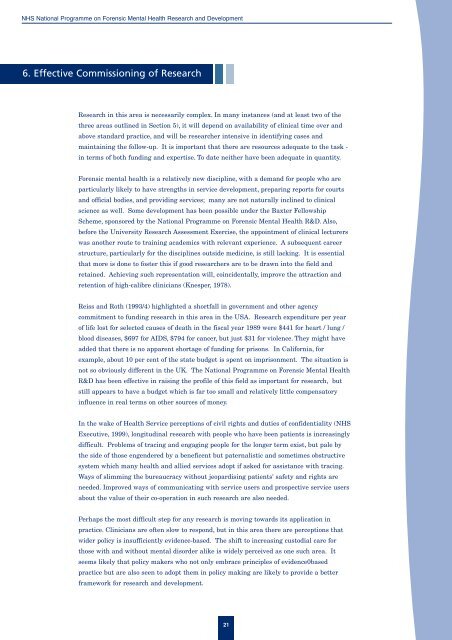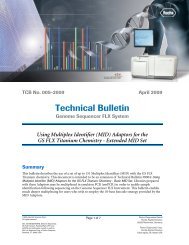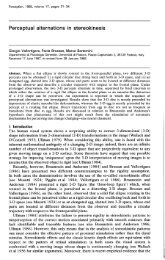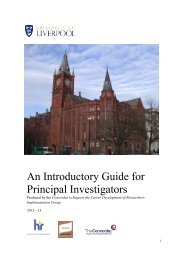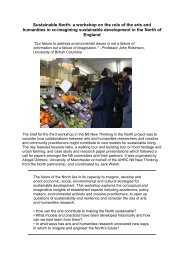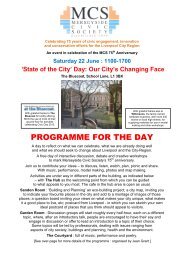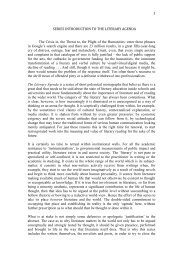Mental Illness and Serious Harm to Others - University of Liverpool
Mental Illness and Serious Harm to Others - University of Liverpool
Mental Illness and Serious Harm to Others - University of Liverpool
Create successful ePaper yourself
Turn your PDF publications into a flip-book with our unique Google optimized e-Paper software.
NHS National Programme on Forensic <strong>Mental</strong> Health Research <strong>and</strong> Development<br />
6. Effective Commissioning <strong>of</strong> Research<br />
Research in this area is necessarily complex. In many instances (<strong>and</strong> at least two <strong>of</strong> the<br />
three areas outlined in Section 5), it will depend on availability <strong>of</strong> clinical time over <strong>and</strong><br />
above st<strong>and</strong>ard practice, <strong>and</strong> will be researcher intensive in identifying cases <strong>and</strong><br />
maintaining the follow-up. It is important that there are resources adequate <strong>to</strong> the task -<br />
in terms <strong>of</strong> both funding <strong>and</strong> expertise. To date neither have been adequate in quantity.<br />
Forensic mental health is a relatively new discipline, with a dem<strong>and</strong> for people who are<br />
particularly likely <strong>to</strong> have strengths in service development, preparing reports for courts<br />
<strong>and</strong> <strong>of</strong>ficial bodies, <strong>and</strong> providing services; many are not naturally inclined <strong>to</strong> clinical<br />
science as well. Some development has been possible under the Baxter Fellowship<br />
Scheme, sponsored by the National Programme on Forensic <strong>Mental</strong> Health R&D. Also,<br />
before the <strong>University</strong> Research Assessment Exercise, the appointment <strong>of</strong> clinical lecturers<br />
was another route <strong>to</strong> training academics with relevant experience. A subsequent career<br />
structure, particularly for the disciplines outside medicine, is still lacking. It is essential<br />
that more is done <strong>to</strong> foster this if good researchers are <strong>to</strong> be drawn in<strong>to</strong> the field <strong>and</strong><br />
retained. Achieving such representation will, coincidentally, improve the attraction <strong>and</strong><br />
retention <strong>of</strong> high-calibre clinicians (Knesper, 1978).<br />
Reiss <strong>and</strong> Roth (1993/4) highlighted a shortfall in government <strong>and</strong> other agency<br />
commitment <strong>to</strong> funding research in this area in the USA. Research expenditure per year<br />
<strong>of</strong> life lost for selected causes <strong>of</strong> death in the fiscal year 1989 were $441 for heart / lung /<br />
blood diseases, $697 for AIDS, $794 for cancer, but just $31 for violence. They might have<br />
added that there is no apparent shortage <strong>of</strong> funding for prisons. In California, for<br />
example, about 10 per cent <strong>of</strong> the state budget is spent on imprisonment. The situation is<br />
not so obviously different in the UK. The National Programme on Forensic <strong>Mental</strong> Health<br />
R&D has been effective in raising the pr<strong>of</strong>ile <strong>of</strong> this field as important for research, but<br />
still appears <strong>to</strong> have a budget which is far <strong>to</strong>o small <strong>and</strong> relatively little compensa<strong>to</strong>ry<br />
influence in real terms on other sources <strong>of</strong> money.<br />
In the wake <strong>of</strong> Health Service perceptions <strong>of</strong> civil rights <strong>and</strong> duties <strong>of</strong> confidentiality (NHS<br />
Executive, 1999), longitudinal research with people who have been patients is increasingly<br />
difficult. Problems <strong>of</strong> tracing <strong>and</strong> engaging people for the longer term exist, but pale by<br />
the side <strong>of</strong> those engendered by a beneficent but paternalistic <strong>and</strong> sometimes obstructive<br />
system which many health <strong>and</strong> allied services adopt if asked for assistance with tracing.<br />
Ways <strong>of</strong> slimming the bureaucracy without jeopardising patients' safety <strong>and</strong> rights are<br />
needed. Improved ways <strong>of</strong> communicating with service users <strong>and</strong> prospective service users<br />
about the value <strong>of</strong> their co-operation in such research are also needed.<br />
Perhaps the most difficult step for any research is moving <strong>to</strong>wards its application in<br />
practice. Clinicians are <strong>of</strong>ten slow <strong>to</strong> respond, but in this area there are perceptions that<br />
wider policy is insufficiently evidence-based. The shift <strong>to</strong> increasing cus<strong>to</strong>dial care for<br />
those with <strong>and</strong> without mental disorder alike is widely perceived as one such area. It<br />
seems likely that policy makers who not only embrace principles <strong>of</strong> evidence0based<br />
practice but are also seen <strong>to</strong> adopt them in policy making are likely <strong>to</strong> provide a better<br />
framework for research <strong>and</strong> development.<br />
21


